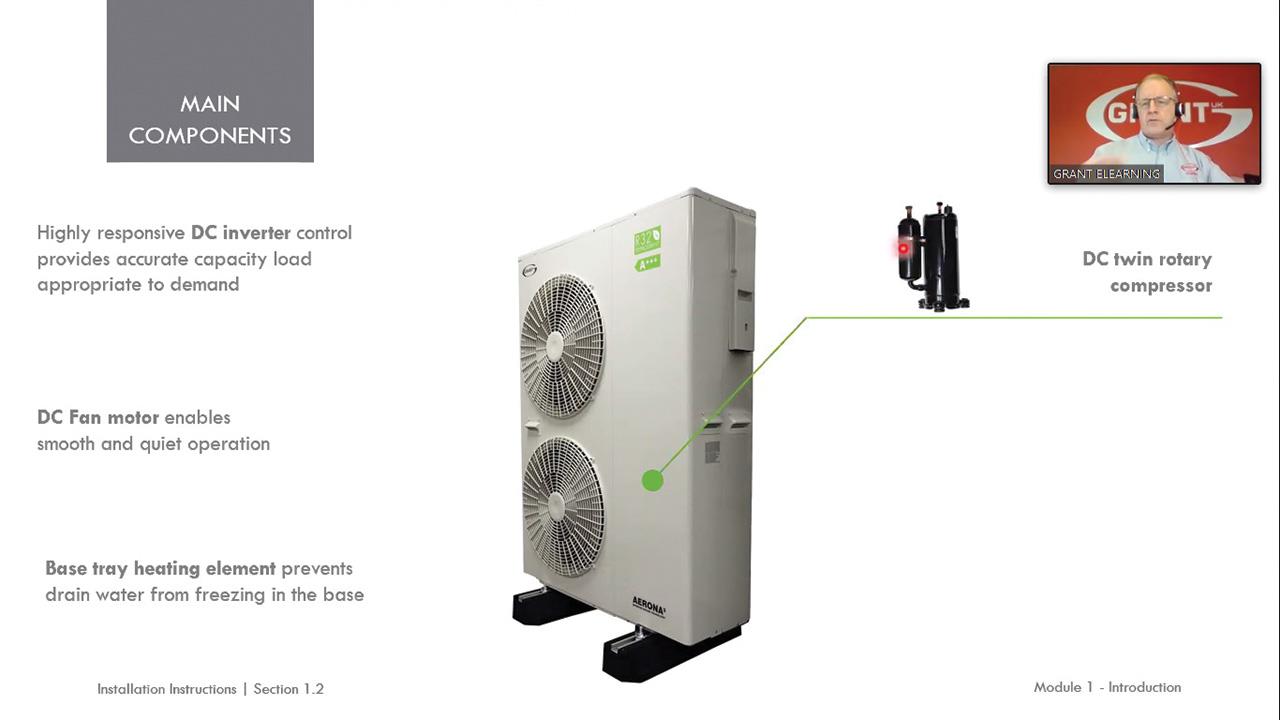


HVP Editor Joe Dart reports on a Grant UK online training course aimed at introducing installers to air source heat pumps (ASHPs).
Many parts of the plumbing and heating industry went into shutdown earlier this year with the introduction of the COVID-19 lockdown. Installer training didn’t go unaffected either, with manufacturers no longer able to hold face-to-face training sessions to brief installers about the latest developments in the sector.
However, a burgeoning alternative has appeared to fill the void – online training. Grant UK is one of many manufacturers to move training online during this period and the company invited HVP to attend its two-day Aerona3 ASHP Advanced Installer Live course, delivered online in real time.
The course is tailored towards installers who have little or no experience of heat pump installation and heat pump requirements, so provides a good opportunity for installers to learn about the potential benefits of incorporating an ASHP offering into their business.
The session was hosted entirely via Zoom by Steve Ellison, Assistant Training Manager at Grant UK. After some brief introductions, Steve launched into a slide presentation overview of Grant’s Aerona3 air-to-water heat pump range, delving straight into some of the complexities of the systems including an explanation of the terminology such as R32 refrigerant, as well an overview of product features including weather compensation and frost protection.
Over the course of the morning session, Steve also dove into detailed technical drawings of key elements of the systems such as the vapour compression cycles of the unit. Using diagrams and a pointer tool, Steve helped to ensure that many of these concepts were easy to follow, despite their complexity.
He also spoke about preparing the unit for installation. For example, the heat pump needs to be left upright for at least four hours before it is used – this is to ensure the lubricant within the system used to protect it ‘resets’. In addition, Steve recommended that all installations within two miles of the coast should use anti-corrosion treatment.
Steve also covered off information about where to install the units (ideally south-facing where possible) and then moved on to provide advice for installers about how they can help their customers access the Domestic Renewable Heat Incentive, and the paperwork they need to fill out.
Wrapping up his focus on Aerona3, he also covered its electrics, control options, operation, and servicing, including fault finding.
Next on the agenda was an optional module for those who wish to know more about the Grant VortexAir Hybrid range – combining a Grant Aerona3 air source heat pump with a Grant high efficiency, low NOx oil boiler. This covered the range’s technical specification, performance, construction, principles of operation, electrical wiring, controller settings, installation, and commissioning.
The second day of the course was all about heat loss and system design, looking at the various types of heat emitter, radiators, convectors, underfloor heating, and the key considerations when using each of these, including the correct sizing. Steve also covered the importance of pipe sizing, and ran attendees through one of the company’s heat loss calculators.
The day culminated in a multiple-choice assessment, with a certificate issued following successful completion. Installers who successfully complete the course are also eligible to apply for Grant G1 Air Source Heat Pump Installer accreditation.
One of the installers in attendance was Liam Blofeld, Managing Director at LGB Plumbing & Heating, who signed up because he wants his business to take advantage of the growing renewables market. He wanted to learn more about Grant systems as he was looking to install more of the company’s systems thanks to its G-CERT Scheme, whereby Grant UK acts as the MCS-accredited organisation for the installer, meaning that the installer doesn’t have to become MCS-accredited themselves.
Liam had obviously attended face-to-face training in the past, but this online-only training session was a first for him. He explained: “I was little apprehensive about doing it over Zoom and was a little bit confused about how it was going to work, but it was really good.”
He’s based in Norwich, so one of the major advantages for him was that he didn’t to make an eight hour round trip to Devizes, where Grant UK’s main training centre is located, saving him both time and money. Although the only minor gripe of the online training was not being able to see the products in person, Liam definitely saw the value in the session he attended.
He concluded: “I’d definitely do it again. If I had the choice and if someone said to me it was going to cost you £200 to do it over Zoom or £300 in the classroom, I’d go with the Zoom one, unless it was really on my doorstep.”
If you'd like to keep up-to-date with the latest developments in the heating and plumbing industry, why not subscribe to our weekly newsletters? Just click the button below and you can ensure all the latest industry news and new product information lands in your inbox every week.